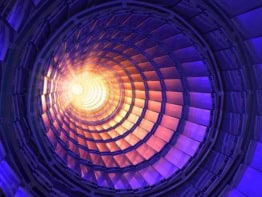
Is it possible for four neutrons to bind together to create an uncharged nucleus called a “tetraneutron”? The answer is a qualified “yes”, according to physicists in the US and France.
The idea of a tetraneutron goes back several decades, but it was not until in 2002 that the first tentative experimental evidence was found – by an international team of physicists working at the GANIL nuclear physics lab in France.
Near discovery
Then, in 2016, physicists working at the RIKEN nuclear-physics lab in Japan found evidence for tetraneutron in a different experiment that involved firing neutron-rich helium-8 nuclei at a helium-4 target. While they did not see direct evidence for a tetraneutron, careful measurements of the two helium-four particles produced in the collision suggest that the other four neutrons involved in the collision emerge in a bound state. The statistical significance of the measurement was 4.9σ – just shy of the 5σ needed for a discovery.
Despite this growing evidence, physicists do not have a clear theoretical understanding of how a tetraneutron could exist. Now, Kevin Fossez, Jimmy Rotureau and Nicolas Michel of the National Superconducting Cyclotron Laboratory at Michigan State University and Marek Płoszajczak of GANIL have done new calculations that are able to reproduce the energy of the tetraneutron observed at RIKEN.
Short lifetime
However, when the team used its method to calculate the energy width associated with the tetraneutron, the researchers found it to be significantly larger than that measured at RIKEN. A larger energy width corresponds to a short lifetime for the tetraneutron, and this has led the team to suggest that the four-neutron system may not stick around long enough to be considered to be a nucleus.
The research is described in Physical Review Letters.



